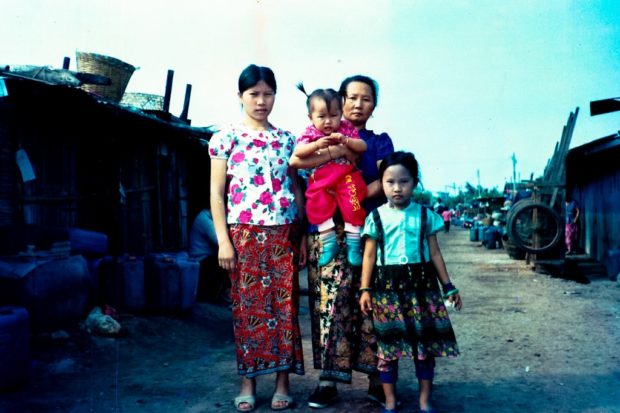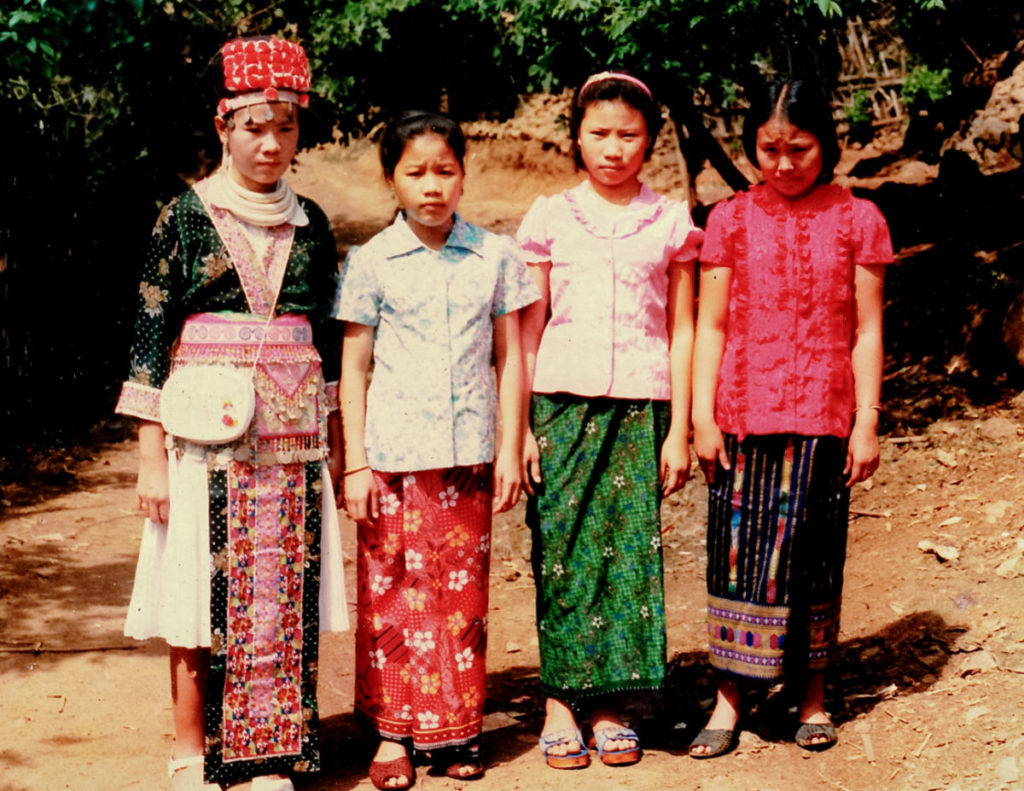
Interview and translation by Chonny Vang
(From the kNOw Youth Media: Fresno is home to the second largest Hmong population in the United States. The Hmong in America originate from Laos and fled that country because they assisted the United States military in the Secret War. Hmong refugees fleeing Laos stayed in refugee camps in Thailand before they were relocated to America and other Western countries. Zoua Vang, 39, grew up in a Thai camp and moved to Fresno in 1994 with her husband, three children and her in-laws. Vang would have five more children who were born in Fresno. One of them, Chonny, 15, is now in Advanced Placement classes, plays on the girls’ volleyball team and plans to attend a four-year university after graduation. Chonny interviewed her mother and translated her story, as a tribute to the hard work and support she has given her children.)

As a child, the first thing I knew was that I had no father. He died in Laos during the Vietnam War, when I was little. My mom explained to me that my father was a soldier for General Vang Pao. In the beginning of the war, a bomb exploded, and shrapnel hit my father in the chest and back.
The doctors successfully removed the shrapnel from his chest, but before they could get to his back, communist Vietnamese and Pathet Lao soldiers took over the Hmong villages, where the major hospital was located. My father went on the run with my family into the mountains of Laos. With no doctors around to remove the remaining shrapnel, he passed away from that injury, hiding from our enemies. After this, my family went to the refugee camp of Ban Vinai in Thailand in order to be safe.
My mom was a great mother. She cared for my three brothers, my sister and me, and gave us lots of love, but she made the decision to remarry, leaving us with my grandma and uncles. After she left, I would [often] cry myself to sleep. My grandma would always say, “Stop crying! If your mother loved you then your mother would never have left you to live with another man.” Sometimes my grandma would hit me because I was crying too much. I missed my mom so much that one day I ran away to stay with her, but the next day my grandma and uncles took me back.
When I lived with my grandma I really wanted to go to school, but my grandma said, “You are a girl. Going to school is not worth anything and won’t benefit your future. Only boys go.” Instead, I cooked all the meals, carried water home from the river, sewed cloth designs, cleaned the house, farmed—anything that is considered a woman’s duty. Sewing clothing designs was the only way to earn money. I wasn’t able to spend time with my friends and close cousins unless we were sewing clothes.
Kids with parents could have an education because their parents would support them. With no parents, I could do nothing. No matter how much hard work I did for my grandma and uncles, I received no thanks or reward. As an orphan, I would look at the children who had parents and imagine my life if I had parents. Would I be treated with respect? Would I be going to school?
But because I didn’t have a mom and a dad, whatever my grandma and uncle said I had to do. They would say, “You must do this—not doing is not an option.” If I didn’t obey their orders, then they said they wouldn’t give me food or let me live under their roof. Because I was an orphan, I had to do what they wanted. Even though they didn’t always give me food, at least I had a place to sleep. Of course, if I went somewhere they’d forbidden, when I came back they would lock me outside of the house and refuse to let me in. They would tell me, “Later when you come back, you sleep outside.”
Finally, when I was about 13, the worst happened—a man asked to marry me. I tried to refuse, but I was exchanged by my family for 6,620 Thai Baht, which is about $200.
Living with my new husband, I did everything that is considered a wife’s duty. After having three kids, we migrated to the United States. My husband works hard for the $42,000 per year he makes, but he and I have some barriers still because we never developed a relationship before we got married.
At first, all of my time was spent taking care of my kids. But now that they are all going to school, I finally have some time to myself. I wish I could go to work, but I don’t have the skills I would need—I can barely understand English. Not having a job stresses me out because everything in this country is based on money. Earning nothing, I don’t have money to pay my bills, or spend on my kids. Here, there is plenty of opportunity to get an education, but I wouldn’t know where to start because I have never gone to school.
Most days, I garden and do housework, but I put those aside when there are award ceremonies or parent-teacher meetings at school. I make those the priority to show support for my children and stay involved with Fresno Unified School District. I have met other Hmong mothers through parent meetings, and many of them also have high-achieving children even though they did not go to school themselves.

Summerset Apartments
I think education is important to everybody, probably the most important thing. Education is the key to a better life—it opens up opportunities. Because I didn’t have the chance to get an education as a child, I am supporting my children’s education in every way I can, so that they will be successful and stress-free, so that they will not endure the life that I lived.
Even though it’s too late for me to get an education, I’m proud of what my children have accomplished. My oldest daughter graduated from UC Berkeley and the next three are all enrolled in different colleges. One of my daughters just won a competitive Dell Scholarship when she graduated high school a year early and enrolled at Fresno State.
It’s hard to relate to what they have accomplished, but I do know that other members of the Hmong community have also succeeded, supported by their family. I am proud of my children, that they are achieving my dream for them of a higher education.
*****
This interview is reprinted with permission from the kNOw Youth Media group. Their mission is to support and equip young people with media skills and a voice to tell their stories and the stories of their communities. You can learn more about and read other stories from the kNOw Youth Media group by visiting www.theknowfresno.org.
